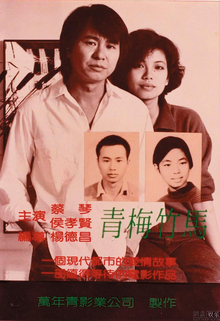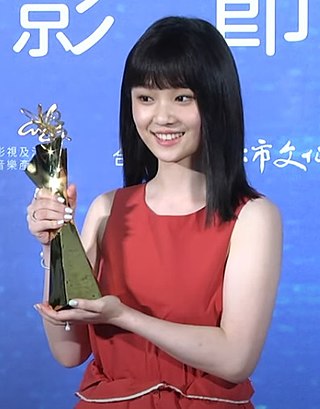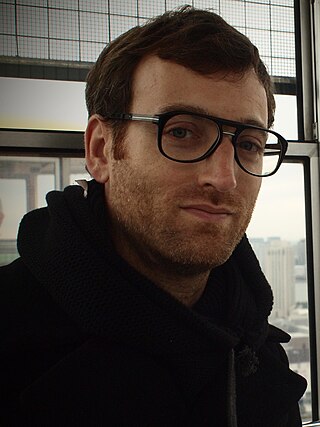
Hou Hsiao-hsien is a retired Mainland Chinese-born Taiwanese film director, screenwriter, producer and actor. He is a leading figure in world cinema and in Taiwan's New Wave cinema movement. He won the Golden Lion at the Venice Film Festival in 1989 for his film A City of Sadness (1989), and the Best Director award at the Cannes Film Festival in 2015 for The Assassin (2015). Other highly regarded works of his include The Puppetmaster (1993) and Flowers of Shanghai (1998).

Flowers of Shanghai is a 1998 Taiwanese drama film directed by Hou Hsiao-hsien. It is based on the novel The Sing-song Girls of Shanghai (1892) by Han Bangqing, which was originally written in the Wu language (吳語) and translated into Mandarin Chinese by Eileen Chang. The film stars Tony Leung as a wealthy patron and Hada Michiko, Annie Shizuka Inoh, Shuan Fang, Jack Kao, Carina Lau, Rebecca Pan, Michelle Reis and Vicky Wei as "flower girls" in four high-end Shanghai brothels. It was voted the third best film of the 1990s in the Village Voice Film Poll conducted in 1999. The film was selected as the Taiwanese entry for the Best Foreign Language Film at the 71st Academy Awards.

Lim Giong is a Taiwanese musician, DJ, actor, and an active figure in the Taiwanese experimental electronic music scene. He is known for recording rock songs in Taiwanese Hokkien, starting with his first hit song "Marching Forward" in 1990. He is also known as writing film scores for directors such as Hou Hsiao-hsien, Jia Zhangke, and Bi Gan. His has received numerous awards for his work, including the Cannes Soundtrack Award in 2015 for The Assassin.

Dust in the Wind is a 1986 Taiwanese film directed by Hou Hsiao-hsien. It is based on co-screenwriter Wu Nien-jen's own experiences, and is the first of a trilogy of Hou and Wu's collaborations, the others being A City of Sadness (1989) and The Puppetmaster (1993).
Chen Kun-hou (陳坤厚) is a veteran cinematographer, who started his career in the 1960s. He won his first best cinematography award at Golden Horse Awards in 1978 for He Never Gives Up (汪洋中的一條船), directed by Lee Hsing (李行). In the early 1980s he began to direct his own films in collaboration with Hou Hsiao-hsien (侯孝賢). After series of urban comedies, he made quite a few representative films of the Taiwan New Cinema, such as Growing Up, which won him the best director award at the Golden Horse Awards, His Matramony, which won him the second best cinematography award at Golden Horse Awards, and My Favorite Season, and Osmanthus Alley. He is awarded for his life achievement in Taiwan cinema at the 60th Golden Horse Awards in 2023.

Taipei Story is a 1985 Taiwanese film directed by Edward Yang — his second full-length feature film and third overall. The film stars Hou Hsiao-hsien and singer Tsai Chin to depict the grinding relationship of Ah-lung and Ah-chen, who have known each other since childhood in Taipei. It is doomed to fail because Ah-lung cannot forget about the past while Ah-chen is eager to embrace the future as Taipei undergoes modernization and globalization. Taipei Story is one of the representative films of the New Taiwanese Cinema. It won the FIPRESCI Prize at the 38th Locarno Film Festival in 1985.
The Boys from Fengkuei, also known as All the Youthful Days, is a 1983 Taiwanese film directed by Hou Hsiao-hsien. The movie is about a group of impulsive teenagers with nothing to do and high energy. While waiting to be enlisted in the army, they cause trouble in their hometown, Fengkuei, and run away from Penghu to Kaohsiung. From a small town to a big city, through the depression and turmoil of youth they experience unforgettable life scenery and gradually recede from their original youthfulness. It was Hou Hsiao-hsien's first art film after he directed three light comedies in the early eighties and a representative work of the Taiwan New Cinema at its inception.

Dust of Angels is a 1992 Taiwanese crime film directed by Hsu Hsiao-ming, executive produced by Taiwanese filmmaker Hou Hsiao-hsien. It was entered into Directors' Fortnight at the 1992 Cannes Film Festival. "An lah" (安啦) is a Taiwanese Hokkien colloquialism; the title in full roughly translates to "take it easy, lad" or "cool it, kid."

Gingle Wang is a Taiwanese actress and writer. Gingle began her acting career in 2017 in the film All Because of Love. Her breakthrough came in 2019 with the psychological horror film Detention, where her performance won Best Actress at the 22nd Taipei Film Awards and a nomination for Best Leading Actress at the 56th Golden Horse Awards. She has been described by the Harper's Bazaar Taiwan as a rising star amongst the new generation of Taiwanese actresses.
Hou Chi-jan is a Taiwanese director and writer. His works are often related to historical memories.

Father to Son is a 2018 Taiwanese drama film directed and written by Hsiao Ya-chuan. The production companies behind the film are Bit Production in association with Pixelfly Digital Effects.

Tseng Jing-hua is a Taiwanese actor from Yilan. He is best known for playing the character of Birdy in the 2020 film Your Name Engraved Herein, the highest-grossing LGBT film in Taiwan. He also appeared as Wei Chung-ting in the supernatural horror Detention, for which he received a nomination for Best New Performer at the 56th Golden Horse Awards.

Caitlin Fang is a Taiwanese actress. She won the Golden Horse Award for Best New Performer and the Taipei Film Award for Best New Talent for her role in the film American Girl (2021). In 2022, at age 16, Fang became the youngest actor to receive nominations for all three acting awards from Golden Horse Award; namely, Best Leading Actress, Best New Performer and Best Supporting Actress − with the former two for American Girl and the latter for The Post-Truth World (2022).
Yang-Yang is a 2009 Taiwanese film directed by Cheng Yu-Chieh. It is the director’s second feature film, and also the first film in Ang Lee and Khan Lee’s Tui Shou Ji Hua . The film stars Sandrine Pinna, Chang Ruei-Jia, and Huang Chien-Wei to tell the story of a Taiwanese-French biracial girl Yang-Yang, who struggles to balance the image of a nice girl expected of her in the society and her true self longing for love.
Liao Ching-sung, also known as "Liao-san" (廖桑), is a Taiwanese film editor, known for his work with Taiwanese New Wave directors such as Hou Hisao-Hsien, Edward Yang and Wan Jen. He has received numerous accolades including two Golden Horse Awards for Outstanding Taiwanese Filmmaker of the Year, as well as the Special Contribution Award of Golden Horse Awards in 2018.

Hsieh Hsin-Ying, also known as Nikki Hsieh is a Taiwanese actress and model. Her works have expanded in different realms, including advertising, movies,and TV series. She appeared in the movies including Make Up, i WEiRDO, and The Assassin. As for the TV shows, she participated in Light the Night, Love @ Seventeen, and Meet Me @ 1006. In 2006, she participated in Reflections and won the 43rd Golden Horse Award for the Best Supporting Actress.
Singing Chen is a Taiwanese film director, documentary filmmaker, and music composer. She graduated from Advertising in the Department of Mass Communication at Fu Jen Catholic University in 1997. Her works primarily focus on topics related to humanities and arts and culture, and she uses a magical realism approach to establish her visual style. She has received numerous international and domestic awards nominations for her work.
Taiwan New Cinema was a film reform movement initiated by young Taiwanese filmmakers and directors which took place from 1982 to 1987. Taiwan New Cinema films primarily showcase a realistic style with their depictions of subject matter close to the social reality, offering a retrospective look into the lives of the common people. Taiwan New Cinema brought about a new chapter for the cinema of Taiwan with its innovative form and unique style.
Lu Hsiao-Fen is a Taiwanese actress known for her roles in the woman's revenge subgenre within Taiwanese social-realist cinema. In the later years of her career, she was critically acclaimed as an actress in adaptations of Taiwan nativist novels, most prominently A Flower in the Raining Night.

Jake Pollock, also known as 包軒鳴 is an American cinematographer based in Taiwan, whose work covers feature films, short films, commercials and music videos. He has collaborated with internationally acclaimed directors such as Wong Kar Wai, Peter Chan, Lou Ye, and Derek Tsang.












